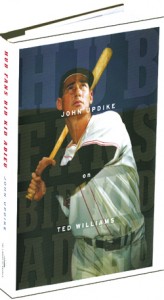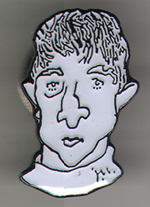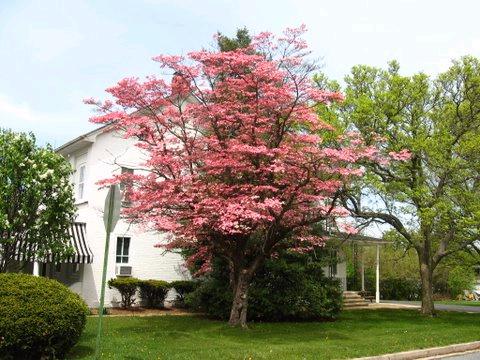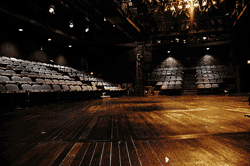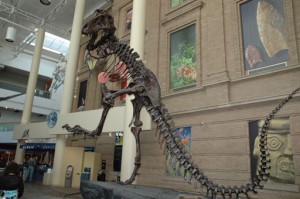In a 1992 interview on The Dick Cavett Show, John Updike told his host that he keeps all of his books from Knopf “in a row, without their jackets, and it’s in this set that I note the typos and gaucheries, so in a sense I have a master set, ready for the new editions and to be further refined.” When Cavett said that book collectors “would be horrified to know that the dust jackets aren’t on,” Updike responded, “Only this one set. Elsewhere in the same small room, there is a full set of them in their jackets and in their several editions and in their translations. It really is a room to enter. You’ve got to be pretty fond of me. Maybe only I can enter it.”
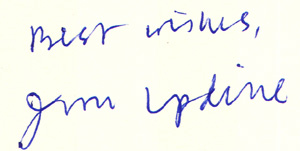 A collector himself, John would always take note of an edition he was asked to sign. When I finally saved up enough money to buy a First Edition of Rabbit, Run many years ago, I sent it to him to sign. It came back with another gracious inscription, but with a Post-It note attached: “Jim—the book is a first edition, but the jacket is not [and he underlined “not”]. It quotes a review—the first had flap copy by me. Best, John.” I contacted the book dealer, who was one of the nation’s most reputable, and it was the first he’d known of this point, which wasn’t detailed in any catalog. But John noticed things like this. He was a stickler for detail and accuracy, as his readers well know. Unlike some authors who dated books if they were signed after publication year, John only dated a book if asked, or if it was a gift. He didn’t want to begrudge any collector his/her treasures.
A collector himself, John would always take note of an edition he was asked to sign. When I finally saved up enough money to buy a First Edition of Rabbit, Run many years ago, I sent it to him to sign. It came back with another gracious inscription, but with a Post-It note attached: “Jim—the book is a first edition, but the jacket is not [and he underlined “not”]. It quotes a review—the first had flap copy by me. Best, John.” I contacted the book dealer, who was one of the nation’s most reputable, and it was the first he’d known of this point, which wasn’t detailed in any catalog. But John noticed things like this. He was a stickler for detail and accuracy, as his readers well know. Unlike some authors who dated books if they were signed after publication year, John only dated a book if asked, or if it was a gift. He didn’t want to begrudge any collector his/her treasures.
According to Lawrence Grobel, who recently had an article on collecting Updike in Autograph Magazine, “pristine copies of his early signed books go for as much as $4500 (Rabbit, Run). Even 50 years after it was published, Rabbit, Run remains the most sought-after of Updike titles, but it’s awfully hard if not impossible to find a copy in pristine condition. Rare book dealer Ken Lopez has one for sale that’s fine in a near-fine, price-clipped dust jacket “with some slight rubbing and a tear at the lower rear spine fold,” signed, for $2000. There’s another copy on eBay now for $450 minimum bid, but it’s a little rough-looking and also has a signed bookplate—so Updike never held the book in his hands. But that’s all that seems to be out there right now, which would all but validate what Grobel is saying.
By comparison, Grobel says that signed copies of The Centaur are fetching $1800, while The Poorhouse Fair is commanding $875 and Pigeon Feathers $350. But the good news for new collectors just discovering Updike’s works is that the author so graciously signed so many books that there are a lot of the newer volumes out there for $100 or less. Hemingway and Fitzgerald Society members should be so lucky.
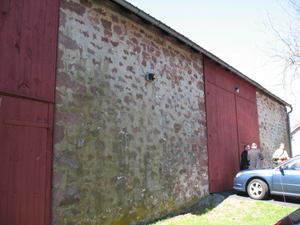 Program director Jack De Bellis will continue to accept paper proposals until the end of April, so it’s not too late to email him your proposal and become a part of the historic First Biennial John Updike Society Conference, which will be hosted by Alvernia University in Reading, Pa., October 1-3 2010.
Program director Jack De Bellis will continue to accept paper proposals until the end of April, so it’s not too late to email him your proposal and become a part of the historic First Biennial John Updike Society Conference, which will be hosted by Alvernia University in Reading, Pa., October 1-3 2010.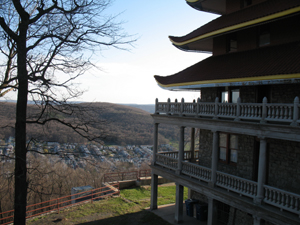 the Pagoda/Pinnacle described in Rabbit, Run. The conference celebrates the 50th anniversary of the publication of Rabbit, Run.
the Pagoda/Pinnacle described in Rabbit, Run. The conference celebrates the 50th anniversary of the publication of Rabbit, Run.
